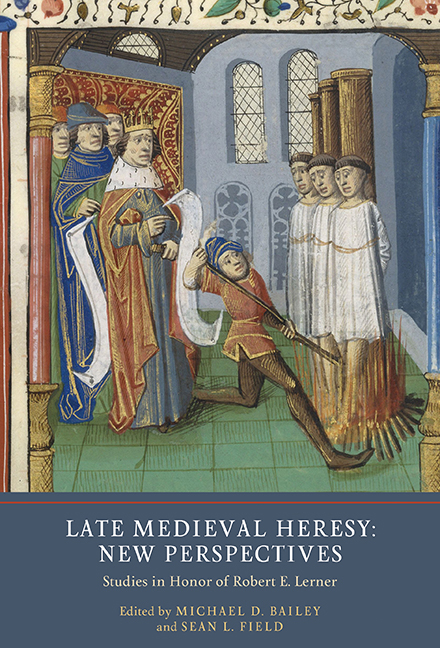Book contents
- Frontmatter
- Contents
- Preface: Robert E. Lerner: A Portrait
- List of Contributors
- Introduction: Historiography, Methodology, and Manuscripts: Robert E. Lerner and the Study of Late Medieval Heresy
- 1 The Heresy of the Templars and the Dream of a French Inquisition
- 2 The Dissemination of Barthélemy Sicard's Postilla super Danielem
- 3 Magic, Mysticism, and Heresy in the Early Fourteenth Century
- 4 The Making of a Heretic: Pope John XXII's Campaign against Louis of Bavaria
- 5 Unusual Choices: The Unique Heresy of Limoux Negre
- 6 Princely Poverty: Louis of Durazzo, Dynastic Politics, and Heresy in Fourteenth-Century Naples
- 7 Disentangling Heretics, Jews, and Muslims: Imagining Infidels in Late Medieval Pastoral Manuals
- 8 New Frontiers in the Late Medieval Reception of a Heretical Text: The Implications of Two New Latin Copies of Marguerite Porete's Mirror of Simple Souls
- 9 Disputing Prophetic Thought: The 1466 Questio quodlibetalis of Johannes of Dorsten
- 10 Heretics, Allies, Exemplary Christians: Latin Views of Ethiopian Orthodox in the Late Middle Ages
- 11 ‘By them in reality I meant the Jews’: Medieval Heretics in the Work and Life of Renate Riemeck (1920–2003)
- Afterword: Who or What Was a Heretic in the Late Middle Ages?
- Robert E. Lerner: A Chronological Bibliography
- Index
- York Medieval Press: Publications
Preface: Robert E. Lerner: A Portrait
Published online by Cambridge University Press: 14 June 2019
- Frontmatter
- Contents
- Preface: Robert E. Lerner: A Portrait
- List of Contributors
- Introduction: Historiography, Methodology, and Manuscripts: Robert E. Lerner and the Study of Late Medieval Heresy
- 1 The Heresy of the Templars and the Dream of a French Inquisition
- 2 The Dissemination of Barthélemy Sicard's Postilla super Danielem
- 3 Magic, Mysticism, and Heresy in the Early Fourteenth Century
- 4 The Making of a Heretic: Pope John XXII's Campaign against Louis of Bavaria
- 5 Unusual Choices: The Unique Heresy of Limoux Negre
- 6 Princely Poverty: Louis of Durazzo, Dynastic Politics, and Heresy in Fourteenth-Century Naples
- 7 Disentangling Heretics, Jews, and Muslims: Imagining Infidels in Late Medieval Pastoral Manuals
- 8 New Frontiers in the Late Medieval Reception of a Heretical Text: The Implications of Two New Latin Copies of Marguerite Porete's Mirror of Simple Souls
- 9 Disputing Prophetic Thought: The 1466 Questio quodlibetalis of Johannes of Dorsten
- 10 Heretics, Allies, Exemplary Christians: Latin Views of Ethiopian Orthodox in the Late Middle Ages
- 11 ‘By them in reality I meant the Jews’: Medieval Heretics in the Work and Life of Renate Riemeck (1920–2003)
- Afterword: Who or What Was a Heretic in the Late Middle Ages?
- Robert E. Lerner: A Chronological Bibliography
- Index
- York Medieval Press: Publications
Summary
In 1977, several medievalists at Northwestern University joined together in teaching an undergraduate Introduction to the Middle Ages. Planning and teaching of this course was collaborative, but Robert Lerner, then in his thirties and recently promoted to full professor, played a crucial role at all stages. His lectures set a dauntingly high standard for the other faculty, myself included, who followed him in lecturing and did so while he and other colleagues sat in the auditorium alongside the students. Every one of his lectures was a work of art whose crafting was accentuated by a carefully practiced delivery that radiated deep and powerful intellectual energy. One day he lectured on the English monarchy, focusing in particular on Henry II, whose innovations, Lerner explained, were major landmarks in the development of English government and of Anglo-American public life. We might have heard from friends or relatives who had been called for jury duty and had seen this as a valuable opportunity for engagement in the life of the community – and in testifying to the importance of jury duty such people were bearing witness to the long-range impact of Henry II's innovations, which represented a step forward in the development of civil institutions. When class was over, I asked Robert whether he was committed to some version of a teleological view of history, and he immediately disclaimed any such view. A few days later, however, he returned to my question and gave a more nuanced answer. In his research he had no commitment to teleology, but in his teaching he remained under the influence of his own mentor, Joseph Strayer, whose work on the medieval origins of the modern state did rest on a firm conviction that the broad arc of institutional development was one of long-range progress.
This exchange points toward several aspects of Robert Lerner and his work. His returning to my question and giving a different answer is in itself significant: always open to fuller reflection, he often revisits and revises what he has said, orally or in writing. He revealed on this occasion a typically profound sense of indebtedness to his Doktorvater. It might seem perplexing that he allowed himself a kind of teleological perspective in teaching that he would not embrace in his research, but on this point too he might be open to further nuance.
- Type
- Chapter
- Information
- Late Medieval Heresy: New PerspectivesStudies in Honor of Robert E. Lerner, pp. vii - xiiiPublisher: Boydell & BrewerPrint publication year: 2018



